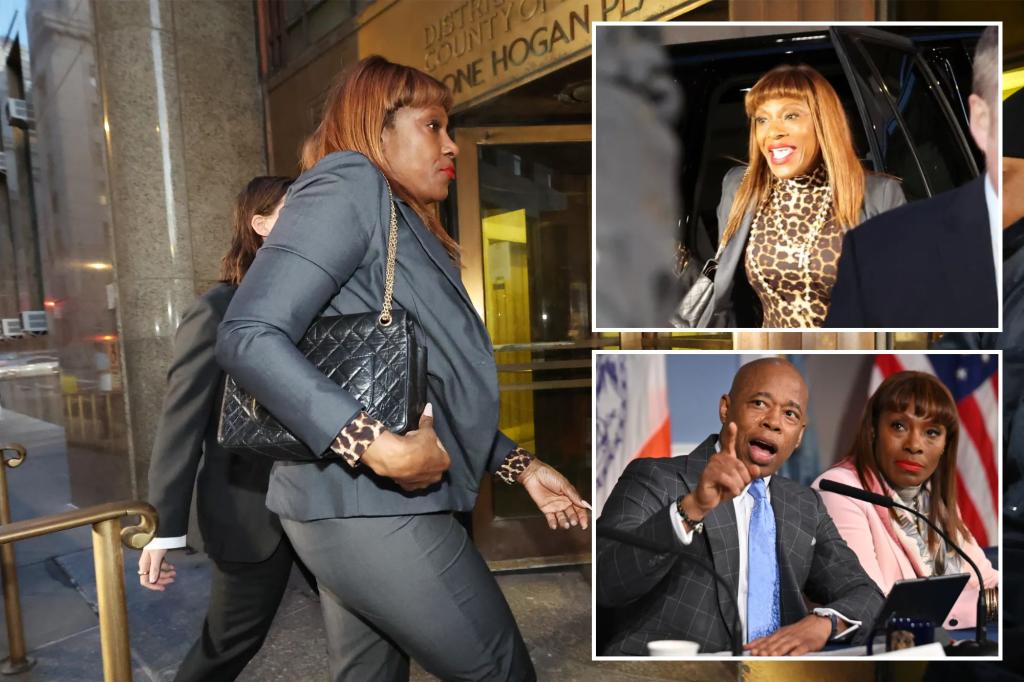Ingrid Lewis-Martin, a close advisor to New York City Mayor Eric Adams, has been indicted on bribery charges, marking a significant escalation of legal troubles surrounding the mayor’s administration. The indictment alleges a complex scheme involving Lewis-Martin, her son Glenn Martin II (also known as DJ Suave Luciano), hotelier Mayank Dwivedi, and real estate investor Raizada Vaid. The core accusation is that Lewis-Martin leveraged her influence within City Hall to expedite permits for businesses owned by Dwivedi and Vaid, in exchange for bribes funneled to her son. Specifically, the indictment alleges that Dwivedi and Vaid provided two $50,000 checks to Martin II, which were then used to purchase a Porsche. This alleged quid pro quo arrangement centers around permit issues related to the Glass Ceiling rooftop bar near Herald Square and the Hotel on Rivington on the Lower East Side. The Manhattan District Attorney’s office paints a picture of Lewis-Martin abusing her position to enrich herself and her family, undermining the integrity of city government.
The indictment details a concerted effort to conceal the alleged bribery scheme. Prosecutors contend that Lewis-Martin instructed the involved parties to communicate using Signal, an encrypted messaging app, and to employ coded language in their conversations. This alleged attempt to obscure the transactions suggests a conscious awareness of wrongdoing and a deliberate effort to avoid detection. The indictment also alleges that the $100,000 provided to Martin II was deposited into a joint account shared with his mother, further intertwining Lewis-Martin with the financial transactions. The subsequent transfer of funds to Martin II’s business, Suave Productions, and the eventual purchase of the Porsche form a clear chain of events that prosecutors will likely present as evidence of the alleged bribery scheme. The detailed financial trail outlined in the indictment suggests a thorough investigation by authorities, leaving little room for ambiguity regarding the flow of money.
The indictment of Lewis-Martin comes on the heels of federal corruption charges against Mayor Adams himself, creating a cloud of suspicion and scandal over City Hall. The timing of these events further complicates the situation for the Adams administration, as it struggles to maintain public trust amid multiple investigations into its inner circle. Lewis-Martin’s abrupt resignation shortly before the indictment adds another layer of intrigue to the unfolding drama. While Lewis-Martin and her attorney have vehemently denied the allegations, characterizing them as politically motivated, the indictment paints a different picture. The charges are serious and could carry significant penalties if proven in court. The convergence of these legal challenges poses a formidable obstacle for the mayor and his team as they navigate the fallout.
The investigation leading to the indictment was a joint effort between the Manhattan District Attorney’s office and the city Department of Investigation. This collaboration underscores the seriousness with which authorities are pursuing allegations of corruption within City Hall. The investigation extends beyond Lewis-Martin, with authorities seizing phones and issuing subpoenas to other city officials and individuals involved in real estate dealings. The scope of the investigation suggests a broader effort to uncover potential wrongdoing and hold those responsible accountable. The focus on city real estate transactions raises questions about potential systemic issues within the city government and the potential for abuse of power in the allocation of valuable resources.
Lewis-Martin’s long-standing relationship with Mayor Adams, described as akin to a sibling bond, adds a personal dimension to the legal proceedings. Their close association, spanning decades, raises questions about the extent of the mayor’s knowledge of Lewis-Martin’s activities and whether he benefited in any way from the alleged scheme. Reports of strained relations between the two in recent months further complicate the narrative. The indictment undoubtedly casts a shadow over their relationship and raises concerns about the judgment of the mayor in surrounding himself with individuals now facing serious legal challenges. The long-term impact on their personal and professional relationship remains to be seen.
The indictment sheds light on several other individuals involved, including the hoteliers and Lewis-Martin’s son. Dwivedi’s high-profile clientele and ownership of luxury hotels adds a touch of glamour to the otherwise sordid affair. The involvement of Martin II, a DJ performing under the name Suave Luciano, creates a compelling subplot to the larger narrative of alleged corruption. His performances at city-sponsored events, coupled with his mother’s public comments about his volunteer work, now take on a different meaning in the context of the indictment. The confluence of these characters from different spheres of New York City life creates a captivating drama that is likely to continue unfolding in the months to come. The legal proceedings will undoubtedly delve deeper into the roles played by each individual and their connections to the alleged bribery scheme.

